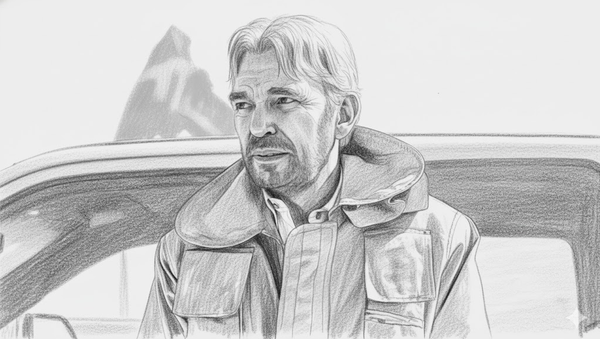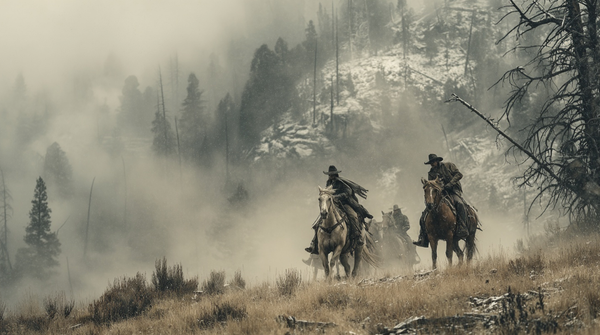The Most Heartbreaking Love Story on TV Is Also Its Most Frustrating
Onscreen, in the vast and unforgiving landscape of early twentieth-century Montana, a man named Spencer Dutton leaps from a moving train into the teeth of a blizzard. He has spotted, through the whirl of white, a stalled motorcar nearly buried by the drifts. Inside is his wife, Alexandra, whom he believed to be on a different train, safe. His desperate sprint through the snow, the frantic embrace, the sheer, operatic relief—it is a tableau of pure, heart-stopping romance, the kind of grand gesture that costume dramas are built upon. For many who watch Taylor Sheridan's series 1923, a sprawling prequel to his neo-Western behemoth Yellowstone, this moment is the emotional zenith of the season, if not of recent television writ large. It is the culmination of a love story so epic it feels etched into the very landscape.

And yet, for another, seemingly equal portion of its audience, this same sequence of events marks the beginning of the end—not of the story, but of their faith in it. What follows this heroic rescue, they argue, is a cascade of baffling character choices, narrative incoherence, and a sense of profound artistic betrayal. The series, which gallops across continents and juggles multiple, weighty historical themes, inspires a critical reception that is itself a study in contrasts: viewers are either swept away by its romantic grandeur or left feeling, as one exasperated commentator put it, "utterly swindled." Examining this schism offers a curious insight into the potent, and peculiar, narrative contract Sheridan extends to his audience.
For the romantics, the story of Spencer and Alexandra, or Alex, is nothing less than a monumental love affair. Their ordeal is one of mythic proportions. After surviving a shipwreck in the Indian Ocean, a lion attack in Africa, and the bitter disapproval of Alex's aristocratic British family, they make their way to America. The final leg of their journey, a more than thousand-mile drive from Chicago to Montana, ends in disaster just a few hundred miles from home. Trapped in a blizzard that, as the show takes pains to note, can make Montana colder than the Antarctic, their Rolls-Royce gives out. It is a tragedy of proximity.
In this reading of the show, what happens next is a study in noble suffering. Alex, having been found frozen, develops severe gangrene. Her refusal to accept amputation, the one measure that might save her life, is seen not as a fit of pique but as an act of profound dignity. How could a twenty-three-year-old woman, proponents of this view argue, bear the thought of a life of total dependency, of being cared for in every way by the man she loves? Spencer, a veteran of the Great War who has seen more than his share of shattered bodies, understands her decision with a heavy heart. He remains by her side through her final night. His quiet vigil is seen as the ultimate act of love: respecting her final, terrible choice. The story, like that of Elsa Dutton in the preceding series, 1883, is a tragedy, but one that is earned—a sweeping, tumultuous romance that justifies its narrative arc.
Then there is the other side. This is the viewer who, having witnessed the same events, is left not with a sense of poetic tragedy but with a laundry list of grievances, or what are known in online forums as points for ridicule. "I feel like I've been scammed," one such viewer wrote, launching into a meticulous deconstruction of the plot's logic. Why, precisely, did Alex refuse the surgery? The dialogue, they complain, is a thicket of obscure and difficult pronouncements that fail to provide a satisfying reason. And what of Spencer's devotion? This viewer notes that during a long period of separation earlier in the season, the show offered not a single shot of Spencer pining for his lost wife. His sudden transformation into a stoic mourner, only to pivot instantly to vengeance—waking after her death to declare, "Take me to the man who killed her"—elicits not tears, but laughter.
The critique deepens as it reëxamines the chain of causality. Alex's tragic fate, this argument goes, was precipitated by her own stubborn insistence on attending a shipboard dance, thereby provoking a confrontation with her jilted fiancé. Had she simply kept a low profile, none of the subsequent disasters would have occurred. The true villain is not the rapacious developer threatening the Dutton ranch, but the characters' own inexplicable choices. The show's internal logic seems to crumble under scrutiny. If Spencer can simply ride into town and solve matters with a gun, dispensing with the law, why hadn't his uncle, Jacob, done so months earlier when his own family was being murdered?
This feeling of being cheated extends to the very structure of the series. 1923 devotes a significant and harrowing portion of its runtime to the story of Teonna Rainwater, a young Native American woman enduring horrific abuse at a church-run residential school. Her brutal journey and desperate flight for freedom is a powerful narrative in its own right, yet by the season's end, it has failed to intersect with the central Dutton plot in any meaningful way. A Texas lawman meets both Spencer and Teonna, but the two main threads remain stubbornly parallel, leaving the viewer to wonder at the purpose of it all. "I watched for nothing," the critic laments.
One might be tempted to dismiss these complaints as the pedantic nitpicking of an audience that has forgotten how to suspend disbelief. After all, the Western has always been a genre of myth, not documentary. It operates on archetypes: the stoic hero, the existential threat to the land, the primacy of family honor over formal law. Sheridan's work is a self-conscious heir to this tradition, prioritizing grand emotional crescendos and iconic moments—the hero leaping from the train—over the fussy mechanics of a plausible plot.
Yet the frustration is not without merit. The series presents itself with the gravitas of serious historical fiction, engaging with the genocide of Indigenous peoples, the economic anxieties of the post-war era, and the unforgiving realities of frontier life. It cannot, then, ask its audience to simply ignore glaring lapses in character psychology or narrative logic. The central dissonance of 1923 is that it wants to be both a gritty, prestige drama and a romantic, folkloric epic. The question is whether it can successfully be both at once. For many, it seems, the answer is no. The spell is broken, the narrative contract violated, and the grand romance feels less like destiny and more like a series of unfortunate, and frankly avoidable, blunders. The viewer is left in the cold, much like Alex in her stalled motorcar, wondering how a journey with so much promise could have ended up so hopelessly lost.



